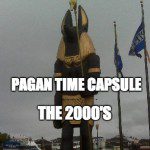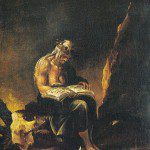 I like writing about Pagan history, but it can be oh so difficult. The histories of most religions are written well after the principle characters have all passed on. Gerald Gardner sometimes feels like a guy from the very distant past, but there are people still around who met Gardner and were even initiated by him. The same is true of Druid Ross Nichols, founder of the Order of Bards, Ovates, and Druids back in 1964. Even Starhawk (who I think is one of the most important Pagan writers of all time) is just 63 and will be around us all for several more decades. We’re young, oh so young, and it’s easy to forget that sometimes.
I like writing about Pagan history, but it can be oh so difficult. The histories of most religions are written well after the principle characters have all passed on. Gerald Gardner sometimes feels like a guy from the very distant past, but there are people still around who met Gardner and were even initiated by him. The same is true of Druid Ross Nichols, founder of the Order of Bards, Ovates, and Druids back in 1964. Even Starhawk (who I think is one of the most important Pagan writers of all time) is just 63 and will be around us all for several more decades. We’re young, oh so young, and it’s easy to forget that sometimes.
(A little note . . . . . This article was originally written as a way of summing up my Pagan Time Capsule series, but also serves as an essay on the challenges that come up when writing about Contemporary Pagan History. Some of the things written about here come directly from the comments section(s) of those articles, others don’t. Read the entire series at these links: The Fabulous Fifties, the Swinging Sixties, Shagging Seventies, Ecstatic Eighties, The Nifty Nineties, and finally the Way Too Recent Aughts.)
The relative youth of Modern Paganism means that we are really close to our “history.” (I’m still surprised that parts of the 90’s were twenty years ago.) When writing about or reacting to Pagan history we are often acting within our own little prisms of experience. I wasn’t alive in the 1960’s but it’s not so far away that the music and books of the era are a mystery to me. My Dad’s record collection is full of 60’s stuff, and I grew up on it to some degree. My living room has two paintings in it, one of them is of Jim Morrison and the other is of The Beatles. I didn’t live during the 60’s, but I sometimes live in the decade regardless.
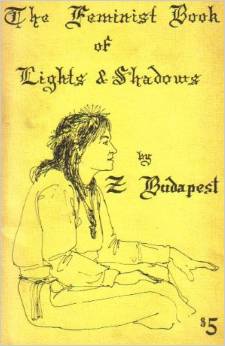 But writing about decades I didn’t really exist in presents a lot of challenges, especially when it comes to Paganism. It’s easy to see stuff from the 50’s, 60’s, and 70’s, but it’s harder to see “Pagan stuff” from those periods of time. When writing about Paganism in those eras I’m often forced to rely on firsthand accounts from friends (which is really hard for the 50’s at this point, still pretty easy for the 70’s and 80’s) and books. I don’t know every “Witch Book” that was published in the 1970’s, but I do know which ones were the most influential and long-lasting. I know those things because those are the books I own, and have seen lining the racks of many a used bookstore.
But writing about decades I didn’t really exist in presents a lot of challenges, especially when it comes to Paganism. It’s easy to see stuff from the 50’s, 60’s, and 70’s, but it’s harder to see “Pagan stuff” from those periods of time. When writing about Paganism in those eras I’m often forced to rely on firsthand accounts from friends (which is really hard for the 50’s at this point, still pretty easy for the 70’s and 80’s) and books. I don’t know every “Witch Book” that was published in the 1970’s, but I do know which ones were the most influential and long-lasting. I know those things because those are the books I own, and have seen lining the racks of many a used bookstore.
Something like Z. Budapest’s The Feminist Book of Lights and Shadows (1976) was most certainly influential, but how available was it? When used copies start at 400 dollars in 2014 I’m guessing it was pretty tough to get ahold of in certain places. Even Budapest’s first edition of The Holy Book of Women’s Mysteries, Part 1 back in 1979 suffered from a lack of availability. If it’s not something that can be picked up at the mall it’s going to have issues crossing into the broader Pagan consciousness. That’s not a knock on the author or the contents of the book, just a reflection of reality. A self-published book in 1979 is not going to have the type of impact that a similar book published by a major publisher is going to have.
 There’s a lot of Paganism (and even “pseudo-Paganism”) on the margins that I have trouble quantifying. Is Dischordianism an important part of the Pagan story? Most likely, but I’m unsure of how it fits into the larger narrative. I’ve also met Dischordians who don’t think of themselves as Pagans, and I’ve met a whole lot of Pagans who simply “dabble” in it. It’s not so much their tradition as it is a type of ritual they sometimes practice (and the label is often applied only because the ritual in question is unconventional). I’ll sometimes belt out a hearty “Hail Bob!” but I’m not a Bobbie/Sub-Genius. Do I think you need more slack in your life? Sure, but it’s not my way of life.
There’s a lot of Paganism (and even “pseudo-Paganism”) on the margins that I have trouble quantifying. Is Dischordianism an important part of the Pagan story? Most likely, but I’m unsure of how it fits into the larger narrative. I’ve also met Dischordians who don’t think of themselves as Pagans, and I’ve met a whole lot of Pagans who simply “dabble” in it. It’s not so much their tradition as it is a type of ritual they sometimes practice (and the label is often applied only because the ritual in question is unconventional). I’ll sometimes belt out a hearty “Hail Bob!” but I’m not a Bobbie/Sub-Genius. Do I think you need more slack in your life? Sure, but it’s not my way of life.
Apart from organizations there are people I don’t know how to write about in Paganism. Gavin and Yvonne Frost are two people who claim to have sold an extraordinary number of books back in the 1970’s, but I don’t know that for sure. Their version of “Wicca” was also radically different from the conventional standard during that period. They were certainly published by a mainstream press back then and probably had a lot of people sign up for their correspondence courses, but I’m not sure what their legacy actually is. I’ve met a lot of nice Witches who have studied with the Frosts but Gavin and Yvonne don’t show up in Hutton’s Triumph of the Moon and only make a very fleeting appearance in Clifton’s Hidden Children of the Goddess. Today they are probably more well known for inciting controversy than anything they’ve written. If you like them you probably think they are important, if you don’t like them you probably think they exist on the margins. Overall I’m guessing most people out there know almost nothing about them.
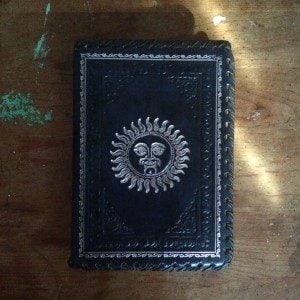 There are also great teachers within traditions who have never crossed over into mainstream Paganism, and I’m guessing most of them never wanted to either. My BoS is full of materials from people most of you have never heard of, and in my house it’s near holy writ. Just because I hold it dear doesn’t mean others do and I’m certainly aware that those individuals mean very little to the average RtH reader. That could also all change in 100 years too, we have no way of knowing. Last decade’s mostly forgotten Pagan Prophet could re-emerge twenty years from now and have a huge impact on Paganism going forward. Our history is still being written.
There are also great teachers within traditions who have never crossed over into mainstream Paganism, and I’m guessing most of them never wanted to either. My BoS is full of materials from people most of you have never heard of, and in my house it’s near holy writ. Just because I hold it dear doesn’t mean others do and I’m certainly aware that those individuals mean very little to the average RtH reader. That could also all change in 100 years too, we have no way of knowing. Last decade’s mostly forgotten Pagan Prophet could re-emerge twenty years from now and have a huge impact on Paganism going forward. Our history is still being written.
“Important” Pagan Music is even harder to write about because until relatively recently it truly existed on the margins. There were Pagan ideas and themes sprinkled into a few mainstream releases (Songs From the Wood by Jethro Tull certainly springs to mind), but Pagan music by Pagans for Pagans has always been a very small market. I’m not knocking the genre, but when you are self financing your own records and relying on mail order sales from the back of magazines your reach isn’t going to be all that strong. There are songs familiar to many of us because they travelled from campfire to campfire at Pagan Festivals, but the number of people who go to festivals is small, and word of mouth only takes one so far. As ground-breaking as I think Gwydion Pendderwen was (and is) his music has always been difficult to get ahold of.
The influence of certain movies on Paganism has always been easier to grasp simply because there are less movies released on a yearly basis versus albums or books. The Wicker Man, Rosemary’s Baby, and The Craft are nearly “beyond debate” when it comes to their importance. However that importance might not always be seen as a good thing. All kinds of smart Witches detest The Craft because it attracted the wrong elements to Witchcraft and portrayed our faith in a mostly negative light. Just because something had an impact on an era doesn’t mean that something was necessarily positive.
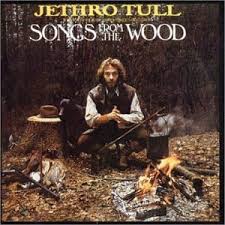 Writing something like the Pagan Time Capsule series allows me to spend a few paragraphs on mostly forgotten corners of our history. Is Dave and Toni Arthur’s Hearken to the Witches Rune the most important Pagan album of the 1970’s? Certainly not, but was it something cool that I wanted to write about? Totally, and it wasn’t significant enough to warrant its own individual post.
Writing something like the Pagan Time Capsule series allows me to spend a few paragraphs on mostly forgotten corners of our history. Is Dave and Toni Arthur’s Hearken to the Witches Rune the most important Pagan album of the 1970’s? Certainly not, but was it something cool that I wanted to write about? Totally, and it wasn’t significant enough to warrant its own individual post.
I’ve written articles like Ten Important Traditional Witches simply because I wanted an excuse to write about Ray Bone, Evan John Jones, and Jo Wilson. I’m not talented enough as a writer to give all of those people their own article (and I don’t have the time either) but I wanted to give them some space and expose their ideas to a wider audience. Sadly anything with a number in it makes people immediately think you are “counting down” things even when you make pains to point out that you are not. There were also many who took exception to the use of the phrase “Traditional Witchcraft” in the title, but what am I supposed to do? I’m writing articles that I hope will appeal to a great many people and I need somewhat catchy titles for them.
Even with the occasional slings and arrows I plan to continue writing about Pagan history because it’s something I love. I hope my passion for it comes through in my work. Being able to be a part of a living, breathing, thing that is still evolving (and hopefully ever will!) has been an honor and a treat. Hopefully as time goes on I’ll have the opportunity and desire to write about more corners of Pagan History and help keep the things I treasure from falling through the cracks or only appearing in the margins.


